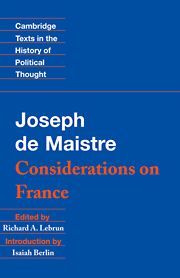Book contents
- Frontmatter
- Contents
- Note on the Introduction
- Introduction
- Chronology
- Bibliography
- Note on the text
- Considerations on France
- 1 Of Revolutions
- 2 Reflections on the Ways of Providence in the French Revolution
- 3 On the Violent Destruction of the Human Species
- 4 Can the French Republic Last?
- 5 The French Revolution Considered in its Antireligious Character
- 6 On Divine Influence in Political Constitutions
- 7 Evidence of the Incapacity of the Present French Government
- 8 Of the Old French Constitution
- 9 How Will the Counter-Revolution Happen if it Comes?
- 10 On the Supposed Dangers of a Counter-Revolution
- 11 From a History of the French Revolution by David Hume
- Postscript
- Index
- Cambridge texts in the history of political thought
5 - The French Revolution Considered in its Antireligious Character
Published online by Cambridge University Press: 05 June 2012
- Frontmatter
- Contents
- Note on the Introduction
- Introduction
- Chronology
- Bibliography
- Note on the text
- Considerations on France
- 1 Of Revolutions
- 2 Reflections on the Ways of Providence in the French Revolution
- 3 On the Violent Destruction of the Human Species
- 4 Can the French Republic Last?
- 5 The French Revolution Considered in its Antireligious Character
- 6 On Divine Influence in Political Constitutions
- 7 Evidence of the Incapacity of the Present French Government
- 8 Of the Old French Constitution
- 9 How Will the Counter-Revolution Happen if it Comes?
- 10 On the Supposed Dangers of a Counter-Revolution
- 11 From a History of the French Revolution by David Hume
- Postscript
- Index
- Cambridge texts in the history of political thought
Summary
Digression on Christianity
There is a satanic quality to the French Revolution that distinguishes it from everything we have ever seen or anything we are ever likely to see in the future. Recall the great assemblies, Robespierre's speech against the priesthood, the solemn apostasy of the clergy, the desecration of objects of worship, the installation of the goddess of reason, and that multitude of extraordinary actions by which the provinces sought to outdo Paris. All this goes beyond the ordinary circle of crime and seems to belong to another world.
Even now, when the Revolution has become less violent, and wanton excesses have disappeared, the principles remain. Have not the legislators (I use their term) passed the historically unique rule that the nation will support no form of worship? Some of our contemporaries, it seems to me, have at certain moments reached the point of hating the Divinity; but this frightful act of violence was not necessary to render the very greatest creative efforts useless. The mere omission (let alone contempt) of the great Being in any human endeavour brands it with an irrevocable anathema. Either every imaginable institution is founded on a religious concept or it is only a passing phenomenon. Institutions are strong and durable to the degree that they are, so to speak, deified. Not only is human reason, or what is ignorantly called philosophy, incapable of supplying these foundations, which with equal ignorance are called superstitious, but philosophy is, on the contrary, an essentially disruptive force.
- Type
- Chapter
- Information
- Maistre: Considerations on France , pp. 41 - 48Publisher: Cambridge University PressPrint publication year: 1994



